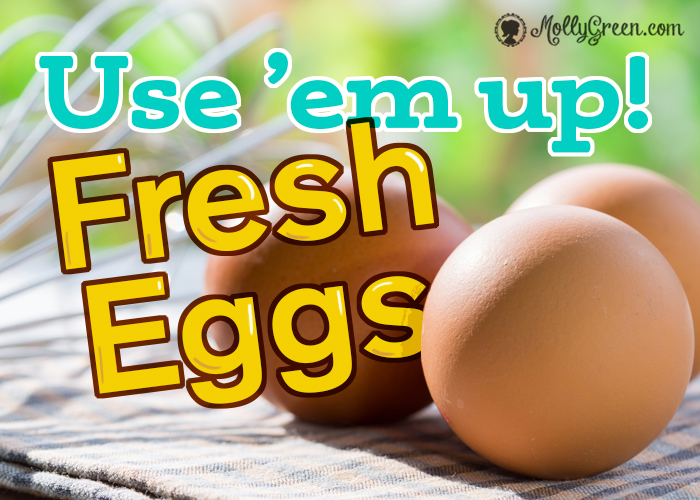by Lisa Steele
Raising chickens in your backyard for the delicious, fresh eggs they lay is becoming a favorite pastime of people from all walks of life. Fresh eggs from chickens allowed to roam freely, looking for weeds, seeds, and bugs to eat, contain more nutrients and less cholesterol and fat than store-bought eggs. In fact, it’s pretty amazing that a humble egg contains everything necessary to produce a baby chick in just twenty-one days. We tend to take eggs for granted, forgetting everything that’s wrapped up inside the unassuming shell, but eggs are pretty fascinating. In this article, I will walk you through everything you need to know about fresh eggs, including how to tell if eggs are fresh, the “egg water test,” cooking, storing eggs, safe handling, and how long fresh eggs last.
How to Tell if Eggs are Fresh
Although it’s not possible to tell if an egg is fertile just by looking at it, there are a few ways to tell if it’s fresh. Next time you go to the supermarket and buy a dozen eggs, first check the code on the egg carton. The date the eggs are packaged is stamped on the carton, with 001 being January 1 and 365 being December 31. You will want to choose a carton with a date as close to the current day as possible to ensure the freshest eggs from your supermarket shelf.
How to do the Egg Water Test
When you get home with your eggs, a simple way to test freshness is to drop one into a glass of water. A very fresh egg will lay on the bottom of the glass. An egg that is several weeks old will start to rise up off the bottom of the glass, leaving the pointed end sitting on the bottom. As the egg ages and air gets through the pores in the eggshell, the egg will continue to rise when “floated,” eventually standing on one end. As long as the egg is still touching the bottom of the glass, it’s okay to eat. A very old egg will float. While it might still be okay to eat, it’s best to toss it.
Peeling Hardboiled Eggs
This same principle of air entering an egg through the eggshell and causing the egg to float explains why very fresh eggs don’t peel well. In an older egg, the air seeping through the pores of the eggshell pushes the membrane away from the shell. This makes peeling a hardboiled egg that is at least a few weeks old easier. The membrane of a fresh egg will stick to the shell, making peeling nearly impossible.
Steaming Fresh Eggs
Don’t let your fresh eggs sit around and get old. I have an easy fix for you. Steam them! Using a bamboo steamer or metal vegetable steamer, put your eggs into the steamer basket over a pot of boiling water. Cover them and steam them for twenty minutes, then plunge them immediately into a bowl of ice water until they are cool enough to handle. Your eggs will peel perfectly every time—even eggs laid that day!
How to Tell if an Egg is Hard Boiled
Did you know an easy way to tell if the eggs in the bowl in your refrigerator are raw or have been hardboiled? Shake the egg. If you hear something sloshing around inside, it hasn’t been cooked. Or, you can spin the egg on the blunt end on the counter. If it spins like a top, it has been hardboiled, if it wobbles, it’s still raw.
Poaching and Sunny-Side Up
While fresh eggs might not be best for hard-boiling, fresh eggs are your best choice for poaching or cooking sunny-side up. The whites of fresh eggs are very thick and won’t spread out in your pan like an older egg white will. As the egg ages, the white thins and gets watery. The yolks of fresh eggs are also firmer, thicker, and stand up taller, so they are less likely to break when you crack the egg.
How to Handle Eggs Safetly
Always crack an egg on a flat surface such as your countertop, not the side of your pot, pan, or bowl. That will help prevent shell shards or bacteria from getting into the egg. Eggs should be washed just prior to cooking by holding them under warm running water (the water should be at least twenty degrees warmer than the egg so any bacteria on the shell isn’t pulled into the egg through the pores in the shell) and gently rubbed with your fingers. Eggs shouldn’t be submerged in a bowl of water to be cleaned because of the chance of bacteria contaminating the sitting eggs. Running water is always the recommended method.
How to Store Fresh Eggs
Eggs should always be stored pointed end down. This is done to keep the yolk centered within the egg white and keep any bacteria that gets into the egg as far as possible from the yolk. There is an air sac located at the blunt end of the egg which increases in size as an egg ages and is where air and bacteria enter the egg. By keeping this air sac at the top of the egg, any air and bacteria which enter the egg will enter through the blunt end into the air sac and encounter the highly alkaline egg white first, which is not a bacteria-friendly environment.
If you store the egg blunt end down, the air pocket will rise, touch the less-alkaline yolk and risk contaminating it. By storing eggs blunt end up, the pocket of air stays away from the yolk, and the egg will also stay fresh longer. The FDA also provides great information on egg safety.
How Long Fresh Eggs Last and Whether to Refrigerate
Fresh, unwashed eggs don’t need to be refrigerated, although they will last about seven times longer if you put them in the refrigerator. One day out at room temperature is equal to about a week in the refrigerator. An egg will still be good to eat after two to three weeks out on the counter, and at least three to four months in the refrigerator. If you buy store-bought eggs or wash your own eggs, then they do need to be refrigerated because washing removes the natural coating on the shell, called the “bloom,” that keeps the air out and keeps an egg fresh.
Lisa Steele is a fifth-generation chicken keeper who lives with her husband and flock of two dozen chickens and ducks on a farm in Maine. She is the author of Fresh Eggs Daily: Raising Happy Healthy Chickens … Naturally and companion duck book titled Duck Eggs Daily. She is also an avid gardener and aspiring herbalist and offers natural poultry keeping advice on her blog.






We gave our 4 chickens fish a week ago. Sadly the eggs have a fish smell to them. I have given them porridge and yoghurt with the course seed hoping to wash out the fish. Any suggestions?
Love the steaming tip–fresh eggs are so hard to peel so I’m looking forward to trying this. Thanks so much for the great article!
Oh I’m so glad you enjoyed it!